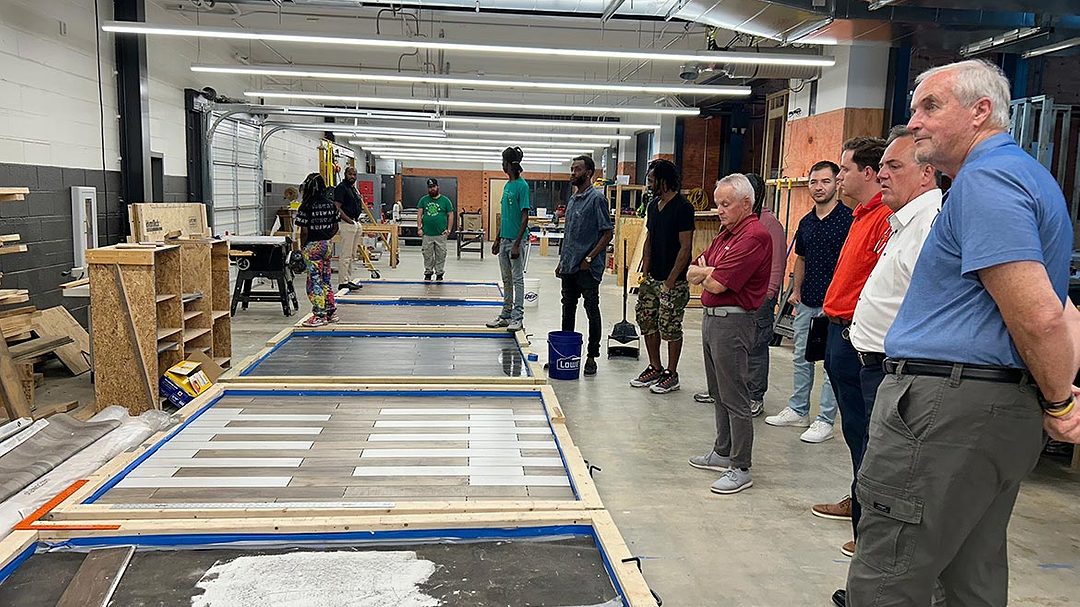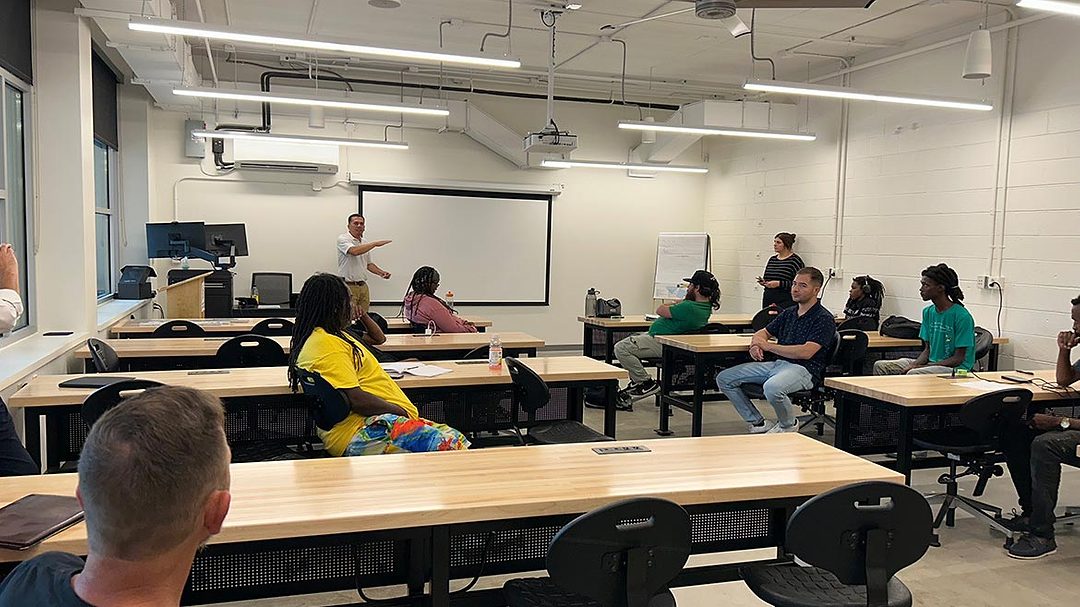Retailers Look to FCEF Education Program to Address Installation Labor Shortage

A group of Georgia and Tennessee flooring retailers recently met with students enrolled in the Basic Floor Covering Installation program at Chattanooga State Community College.
Photo: Floor Trends & Installation.

Photo: Floor Covering Education Foundation.


A group of Georgia and Tennessee flooring retailers recently met with students enrolled in the Basic Floor Covering Installation program at Chattanooga State Community College (CSCC), highlighting the industry's efforts to address a critical shortage of qualified installers. The program, supported by the Floor Covering Education Foundation (FCEF), aims to introduce young people to flooring installation careers and provide them with fundamental skills across multiple flooring types.
“The number one issue we deal with is the installation piece, trying to find qualified people to do the work; it’s a struggle,” said Nik Burdette, general manager of Atlanta Flooring Design Centers. “The FCEF program is an amazing way to expose young people to the opportunities in flooring installation.”
FCEF organized the meeting at the Construction Career Center, a facility formed by partnerships between CSCC, local and state organizations, and trade associations. The center offers dual-enrollment courses and adult courses in various skilled trades, ranging from carpentry to electrical to plumbing and now flooring.
According to Pablo Barbosa, flooring installation program instructor, the program provides students with the opportunity to learn the fundamentals of flooring installation across all four flooring types—hardwood, tile, carpet, and resilient. This includes tool basics, acclimation, floor prep, troubleshooting, board replacement, and the proper terminology.
“If I can take them from an average person, with no floorcovering experience, to an above-average helper, I think I have succeeded,” Barbosa said.
Of the nine students in attendance, some have completed two courses, while others are just entering their first course. The program's flexibility allows students to attend in the evening and at different times throughout the year, depending on when each flooring course is offered.
Tynesha Shackleford is the youngest in the class, only 16 years old. She recognizes the challenge she faces in the job market and plans to use the installation program education to secure a set of skills she can build on to support herself and her mother.
“I'm not like everyone else my age that will rely on their parents,” Shackleford said. “I don't want to rely on her. I want her to rely on me. My father wasn't in my household, so my mom is always paying for everything; I want to do the same thing.”
Antrell Davenport expressed his enthusiasm for the program, “I love the program,” he said. “I'm always open to learning new things.” After getting his GED, he signed up for college, jumping into civil engineering courses and quickly realizing the workload wasn’t realistic for a working adult. He heard about the installation program on the radio. He decided the skills attained would be applicable across a wide range of careers, including engineering, should he decide to return to college.
Dantario Dansby is completing his first course—tile installation. He is working full-time in sales outside of the flooring industry and plans to find his way onto a weekend crew where he can continue his education. He sees value in the entry-level nature of the program: “If every single person that's in this class went on a job site without taking this course, they wouldn't have a clue what to do. They wouldn't even have a clue how to read a tape measure.”
According to Kaye Whitener, director of operations at FCEF, once the students have completed the program, the FCEF team will periodically contact each student to see if assistance is needed to make flooring industry connections. “We're the bridge builder, bringing you and our industry together to help support you on this journey,” she said.
Managing Expectations
“What can the students expect if they choose to make flooring installation a career?” asked FCEF Executive Director Jim Aaron. Each retailer, many of whom were or are veteran flooring installers, took turns offering tips and real-world advice to the class.
Richard Keene, branch manager of Chattanooga Flooring Center, a subsidiary of Atlanta Flooring Design, offers two pieces of advice: “You say you're going to be on the job at 8:00 Monday morning, be there at 8:00 Monday morning. The second thing is to do it right the first time.”
Burdette spoke up about the earning potential available to the students based on what he is seeing with Atlanta Flooring Design: “We’ve got crews that have been with us for 39 years. We've got crews that the lead on the crew makes $500,000 to $600,000 a year, but he may be running five or six crews. Individually, you can easily make six figures and still have a good quality of life.”
Mike Thompson, co-owner of The Rug Rack & Home Décor, a custom area rug retailer based in Chattanooga, Tennessee, points to the fact that the needle on the pay scale has moved very little over the years. To differentiate themselves and make top dollar, the students must be willing to put in the work. “If you are very good, you can make a lot of money because very good installers are hard to find," Thompson said. "Pay attention. Don't try to run out and start your own thing before you know what you're doing. Become very good and you can make some serious money.”
“You want to make sure you don't just work on a crew,” said John Burton, project manager/installation at Design Alternatives, a commercial contractor based in Chattanooga specializing in healthcare. "You want to move up to where you can go out and start your own crew once you learn enough," Burton said. "And once you get to where you can start hiring people and doing your own thing, [you should] start your own company.”
Retailer Feedback and Concerns
Burdette is a long-standing supporter of FCEF and the program. “The facilities and instructors at Chattanooga State are world-class and offer professional insight into the installation process and flooring industry in general," he said.
However, his concerns surround how to capitalize on the training and transfer it to the real world, considering the bulk of the workforce consists of subcontractors.
Burton expressed the challenges they face, “All of the guys that have been in it for 30 or 40 years, they're retiring. Their children don't want to be in it, and so, we're scared. We're having a hard time finding help.”
He sees an opportunity with the program to remedy the installer pipeline issues, “I think we can work with some of these guys here, and they can help us out and maybe help themself out too and learn more.”
Additionally, he sees an answer to the dilemma of unskilled workers approaching him for a job. Now, there is a place he can direct them. “Go to that class first, then come to us,” he said.
Thompson seeks to temper monetary expectations by adding, “I just hope they don't expect to come in here and take this course and immediately go out and start making $100,000 a year. They certainly can, but it needs to be driven home that they will be the product they're selling, and if they want to make that a quality product, be on time, be meticulous, learn everything you can learn about what you do and do a good job.”
See more articles from our September 2024 issue!
Looking for a reprint of this article?
From high-res PDFs to custom plaques, order your copy today!









